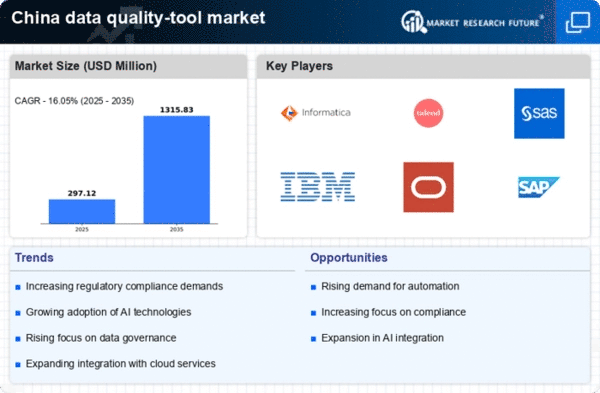Regulatory Compliance Pressures
In China, the data quality-tool market is significantly influenced by increasing regulatory compliance pressures. The government has implemented stringent data protection laws, compelling organizations to adopt robust data quality measures. Compliance with regulations such as the Personal Information Protection Law (PIPL) necessitates the use of advanced data quality tools to ensure that data handling practices meet legal standards. This regulatory landscape creates a substantial opportunity for the data quality-tool market, as businesses seek solutions that not only enhance data quality but also facilitate compliance. The financial implications of non-compliance can be severe, with potential fines reaching millions of yuan, thus driving organizations to invest in data quality tools to mitigate risks associated with regulatory breaches.
Rising Demand for Data Accuracy
The data quality-tool market in China experiences a notable surge in demand for enhanced data accuracy. As organizations increasingly rely on data-driven decision-making, the need for precise and reliable data becomes paramount. This trend is particularly evident in sectors such as finance and healthcare, where data integrity is critical. According to recent estimates, the market for data quality tools in China is projected to grow at a CAGR of approximately 15% over the next five years. This growth is driven by the necessity for businesses to maintain competitive advantages through accurate data analysis. Consequently, the data quality-tool market is witnessing a shift towards solutions that ensure data accuracy, thereby fostering trust and reliability in data management processes.
Increased Investment in Data Analytics
The data quality-tool market in China is experiencing growth due to increased investment in data analytics. Organizations are recognizing the value of data analytics in driving business insights and strategic decisions. As a result, there is a heightened focus on ensuring that the underlying data is of high quality. This trend is particularly evident in sectors such as manufacturing and logistics, where data analytics is used to optimize operations and improve efficiency. The data quality-tool market is benefiting from this investment, as businesses seek tools that can enhance data quality and support their analytics initiatives. With the market for data analytics projected to reach $20 billion by 2026, the demand for data quality tools is likely to rise in tandem, further propelling the growth of the data quality-tool market.
Growing Emphasis on Customer Experience
The data quality-tool market in China is increasingly shaped by a growing emphasis on customer experience. Organizations recognize that high-quality data is essential for understanding customer preferences and behaviors. As businesses strive to enhance customer satisfaction, they are investing in data quality tools that provide insights into customer interactions. This trend is particularly pronounced in the retail and e-commerce sectors, where personalized marketing strategies rely heavily on accurate data. The data quality-tool market is responding to this demand by offering solutions that enable businesses to clean, enrich, and analyze customer data effectively. As a result, companies are likely to see improved customer engagement and loyalty, further driving the growth of the data quality-tool market.
Technological Advancements in Data Management
Technological advancements play a crucial role in shaping the data quality-tool market in China. Innovations in artificial intelligence (AI) and machine learning (ML) are transforming how organizations manage and ensure data quality. These technologies enable automated data cleansing, validation, and enrichment processes, significantly enhancing efficiency. As businesses increasingly adopt these advanced technologies, the data quality-tool market is witnessing a shift towards more sophisticated solutions that leverage AI and ML capabilities. This trend is expected to drive market growth, as organizations seek to streamline their data management processes and improve overall data quality. The integration of these technologies not only reduces manual effort but also enhances the accuracy and reliability of data, making it a key driver in the evolving landscape of the data quality-tool market.

















